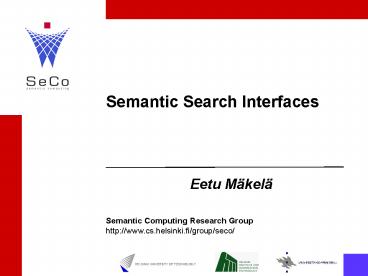Semantic Search Interfaces - PowerPoint PPT Presentation
1 / 19
Title: Semantic Search Interfaces
1
Semantic Search Interfaces
- Eetu Mäkelä
2
Semantic Search Interfaces
- What are they?
- Search interfaces making use of Semantic Web
technologies - Search interfaces for Semantic Web content
3
Contents
- Research directions in semantic search research
- Augmenting Traditional Text Search with Semantic
Techniques - Locating Concepts Efficiently
- Complex Constraint Queries
- Connecting Path Discovery
- Problem Solving via Inference
- Common methodology in semantic search research
- RDF Path Traversal
- Keyword lt-gt Concept Mapping
- Graph Patterns
- Logics
- Fuzzy Concepts, Fuzzy Relations, Fuzzy Logics
4
Thesaurus ontology navigation in text search
query expansion and constraining
- The WordNet ontology containing synonym and
meronym sets for words - Can be used to increase recall by adding synonyms
and meronyms into boolean OR clauses (Finland
Finland OR Suomi OR Helsinki OR Turku OR ..) - Can be used to increase precision by adding part
of the clarification text of a particular meaning
to the query (Java programming language vs.
Java Island vs. Java coffee) - Implementations differ on what relationships of
the thesauri ontologies are navigated and what
terms are picked up for expansion
5
Locating additional information resources in the
ontology after text search
- Locate matching documents with text search
- Using the metadata for the documents located as a
seed, navigate the ontology to locate additional
interesting resources, e.g. the author of the
document, the project the document belongs to,
all other documents of that project etc. - Maybe do it in a generic way, too
6
Providing an ontological front-end to text search
7
Contents
- Research directions in semantic search research
- Augmenting Traditional Text Search with Semantic
Techniques - Locating Concepts Efficiently
- Complex Constraint Queries
- Connecting Path Discovery
- Problem Solving via Inference
- Common methodology in semantic search research
- RDF Path Traversal
- Keyword lt-gt Concept Mapping
- Graph Patterns
- Logics
- Fuzzy Concepts, Fuzzy Relations, Fuzzy Logics
8
Locating Concepts Efficiently
- Single Facet searching through ontology
subsumption hierarchy - (with textual property restrictions)
- http//www.dmoz.org/
- View -based searching
- http//www.museosuomi.fi/
- http//www.museosuomi.fi/orava/
- Browsing from resource to resource
- Orienteering a common search tactic?
- OntoViews semantic rules define relations
between items
9
Contents
- Research directions in semantic search research
- Augmenting Traditional Text Search with Semantic
Techniques - Locating Concepts Efficiently
- Complex Constraint Queries
- Connecting Path Discovery
- Problem Solving via Inference
- Common methodology in semantic search research
- RDF Path Traversal
- Keyword lt-gt Concept Mapping
- Graph Patterns
- Logics
- Fuzzy Concepts, Fuzzy Relations, Fuzzy Logics
10
ICS-FORTH GRQL
11
SEWASIE Graphical Query Formulation Tool
12
Multi-Facet Search can provide a very limited
form of complex constraints
- OntoViews supports limited formal complex
querieshttp//www.museosuomi.fi/tree?lfim0c
25032503c2507250225012500t2504gc2503
2503
13
Contents
- Research directions in semantic search research
- Augmenting Traditional Text Search with Semantic
Techniques - Locating Concepts Efficiently
- Complex Constraint Queries
- Connecting Path Discovery
- Problem Solving via Inference
- Common methodology in semantic search research
- RDF Path Traversal
- Keyword lt-gt Concept Mapping
- Graph Patterns
- Logics
- Fuzzy Concepts, Fuzzy Relations, Fuzzy Logics
14
Connecting Path Discovery
- In the RDF model, items are no more important
citizens than the relations between them - Given a large amount of information in RDF, it
becomes interesting to look at the relation paths
linking resources together in the graph - Here, the challenge is to develop good, while at
the same time general enough heuristics for link
interestingness
15
Contents
- Research directions in semantic search research
- Augmenting Traditional Text Search with Semantic
Techniques - Locating Concepts Efficiently
- Complex Constraint Queries
- Connecting Path Discovery
- Problem Solving via Inference
- Common methodology in semantic search research
- RDF Path Traversal
- Keyword lt-gt Concept Mapping
- Graph Patterns
- Logics
- Fuzzy Concepts, Fuzzy Relations, Fuzzy Logics
16
Problem Solving via Inference
- Inference is one of the proposed core layers on
the Semantic Web stack - However, currently very few programs make use of
inference, because the open world assumption of
RDF/OWL is problematic - http//onto.stanford.edu8080/wino/index.jsp
17
Contents
- Research directions in semantic search research
- Augmenting Traditional Text Search with Semantic
Techniques - Locating Concepts Efficiently
- Complex Constraint Queries
- Connecting Path Discovery
- Problem Solving via Inference
- Common methodology in semantic search research
- RDF Path Traversal
- Keyword lt-gt Concept Mapping
- Graph Patterns
- Logics
- Fuzzy Concepts, Fuzzy Relations, Fuzzy Logics
18
Common Methodology in Semantic Search Research
- RDF Path Traversal
- Locating additional information
- Query formulation
- Gathering information for visualization
- Keyword lt-gt Concept Mapping
- Introducing fuzziness
- Mapping semantic formalisms to natural language
- Graph Patterns
- Complex constraints
- Gathering information for visualization
- Logics
- Formulating graph patterns
- Inference
- Fuzzy Concepts, Fuzzy Relations, Fuzzy Logics
- Calculating fuzzy semantic matches
19
Discussion
- A lot of the methods shown in the paper are
general and modular, and could be made to good
use in the other approaches - Some of the approaches also combine. Simple
concept search is a subset of complex
constraints, while the fuzzy formalisms allow for
keyword searches to be included as equal parts.
As paths are equal partners to resources in the
semantic web, all graph patterns also pertain to
them































